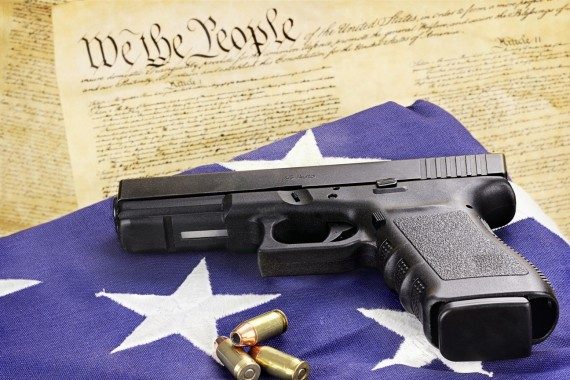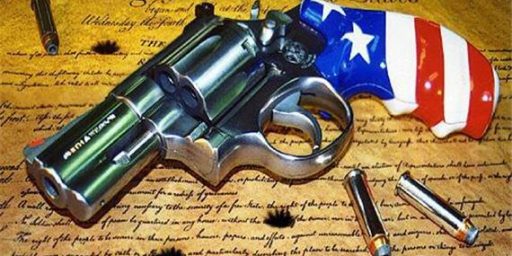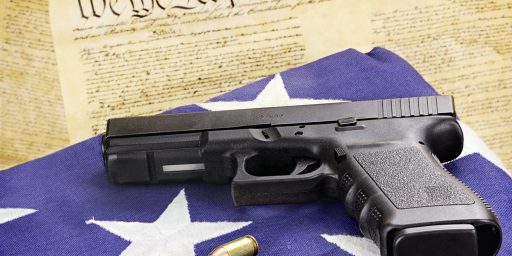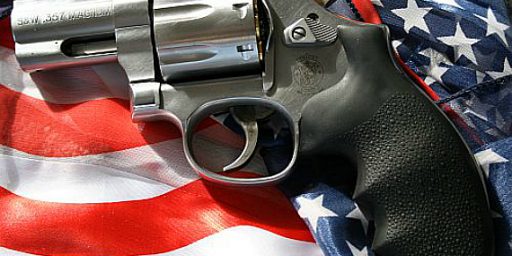D.C. Appeals Court Declines Review Of Ruling Striking Down District’s Concealed Carry Law
A Federal Appeals Court has declined to review a panel decision striking down the District of Columbia's restrictive concealed-carry law.
Earlier this year, a three-judge panel of the D.C. Circuit Court of Appeals struck down Washington D.C.’s stringent law regarding the issuance of a permit for residents to carry a gun in public, ruling that the statute’s requirement that residents provide a “good reason” justifying their need for a concealed carry permit violated the Second Amendment in light of the Supreme Court’s ruling in D.C. v. Heller and McDonald v. Chicago. In response, the District sought review of the ruling by the full D.C. Circuit, a move that could have stopped enforcement of the panel’s ruling had the full court decided to take the case. Yesterday, though, the Court denied the District’s case for en banc review, leaving the District with just one more option:
D.C. officials will not be able to enforce the city’s strict limits on carrying concealed firearms on the streets of the nation’s capital under a court order issued Thursday.
The brief statement from a federal appeals court in Washington is the latest setback for the District’s efforts to restrict the carrying of guns in public places to people who demonstrate a “good reason” to do so.
The District’s top lawyer had asked the full U.S. Court of Appeals for the D.C. Circuit to rehear a challenge to the gun-control law after a panel of three judges ruled against the city in July. But on Thursday, the appeals court declined, without explanation, to revisit the case.
The city’s permitting system had remained in effect while the appeal to the full court was under review — a holding pattern that meant the District still was able to bar most residents from carrying concealed guns.
The city now has seven calendar days to decide whether to ask the appeals court to put Thursday’s ruling on hold as it decides whether to seek review by the Supreme Court.
The order from the D.C. Circuit indicates that none of the court’s 10 judges who reviewed the city’s petition asked for a vote on the request for rehearing.
“We’re pleased that our victory remains intact and that people in Washington, D.C., will have the ability to defend themselves against violent crime,” said attorney Alan Gura, who represents one of the challengers, Brian Wrenn. “The city has some decisions to make now as to whether they want the Supreme Court to take a look. We wouldn’t necessarily oppose that.”
D.C. Council member Charles Allen (D-Ward 6), who leads the Judiciary and Public Safety Committee, said the court’s decision not to rehear the case “puts the city in a bind.”
“Our city will be less safe with more guns on the streets and it will make the job of our metropolitan police officers all the more difficult,” Allen said in a statement.
City officials and gun rights groups have tangled in court for years over the District’s gun laws, which led to a landmark 2008 Supreme Court case that declared for the first time a Second Amendment right to gun ownership separate from military service.\
On some level, the full Court’s decision to not hear the case is surprising. As it turned out, the three-judge panel that originally heard the appeal in this case was made up of Judges appointed by Republican Presidents, which is itself something of a odd coincidence given that there are currently only three Republican-appointed Judges among the ten Judges that are in active status, although there are six Republican-appointed Judges who continue to serve on a limited basis in Senior Status. In this particular case, the panel consisted of two of the GOP appointed active Judges, and one of the GOP appointed Senior Judges who was apparently appointed because of availability issues among the other active Judges (not an uncommon occurrence on a court as busy as the D.C. Circuit). When it comes to granting en banc review, though, only the active Judges are allowed to vote, meaning that the seven Democratic appointees on the Court could have easily formed a majority to vote to accept the case if they’d chosen to do so. While the order denying en banc review doesn’t specify any reasons for the denial, the fact that the ruling was denied and that none of the Judges even sought to ask for a formal vote on the petition indicates that they did not believe the decision was wrongly decided. In any case, this means that the initial decision continues to remain in effect and that the ruling will stand unless it is put on hold, which seems unlikely at this point.
At this point, of course, the District’s only option, if it wishes to preserve its existing law, is to seek review by the Supreme Court, but it’s not at all clear that the Justices are any more inclined to hear a Second Amendment than they have been in the seven years since the Court’s decision in McDonald v. Chicago, which held that the Second Amendment, and the Court’s ruling in D.C. v. Heller, applied to the states. Since then, with the singular exception of one case that didn’t directly deal with Second Amendment issues, the Court has not accepted a case involving gun rights for appeal. This has included a Ninth Circuit case that upheld a California law similar to the one that was struck down in this case. In other cases, the Justices have declined to accept in a case involving New York State’s laws regarding carrying guns in public , another case involving a similarly restrictive New Jersey law regarding carrying concealed weapons, a 2015 case involving San Francisco’s law regulating handguns, and a 2016 decision regarding laws adopted by New York and Connecticut in the wake of the shooting at Sandy Hook Elementary School. As I’ve said in the past, this suggests that the Court is willing to let the Circuit Courts hammer this issue out for the time being.
That time could be coming to an end, though. Not only has the membership of the Court changed, albeit slightly, in the time since most of those cases were denied Supreme Court review, but we also now have a Circuit split on a significant Constitutional issue. As noted above, all of the previous cases that the Supreme Court has declined to review have involved cases where the lower Court upheld a state’s concealed carry law against a challenge under the Second Amendment. While there have been some Circuit Court cases where a particular state’s concealed carry law was struck down, those cases have been resolved by means other than seeking Supreme Court review. In 2012, the Seventh Circuit Court of Appeals, struck down Illinois’s restrictive concealed carry law. Rather than appealing that ruling, the state revised their laws in a manner that at least tried to comply with the Court’s holding in the case. So far, that new law has not been challenged, so it’s unclear whether it would pass Constitutional muster or not, but the result has been that it is now far easier for Illinois residents to carry weapons in public legally. Theoretically at least, the District court decides to go this route, of course. If it doesn’t, though, then it will have to rely on the Supreme Court finally breaking seven years of silence on the Second Amendment.





A gun post with no comments? Hello? Is this thing on?
I have to say I do not understand DC’s position. Was there an attempt to remove background checks or training? I do not think those of us who want common sense gun laws also want to institute what are effectively bans when we have what we want. We can’t say that to “well regulate” the right to “keep and bear” we just want Universal Background Check, wait periods, and training, and then in places where we have that, go for bans. That actually proves the NRA’s narrative that in the end we want and will fight to get bans. This “prove a need” is more than problematic. It is effectively a ban on averaWhat if a jurisdiction abuses it, by only giving it out to 20% or 30% of who otherwise qualify?
DC’s position on this is actually damaging to sensible gun laws.
FYI there’s a good article on guns in the current Scientific American (paywall). Talks about the difficulty of doing research since the NRA got congress to bully the CDC. Does cite old research showing that having a gun unlocked and loaded in a home multiplies the chance of homicide in the home by 2.7 times and the odds of a suicide by 9.2 times.
Households with firearms owned by non criminals are about 25% safer than homes with no firearms.
And owning a firearm raises suicide by gun but not overall suicide, as we know from Australia where overall suicide did not change
More and more people know this:
http://assets.pewresearch.org/wp-content/uploads/sites/12/2015/04/FT_15.04.01_guns_Safer.png
The bogus claim otherwise is why the CDC got its funding to third party gun lobby researchers yanked, and in fact when the news came out that they did not control for criminals (over 90% of murder is committed by prior criminals and over 90% of homicide victims are criminals).
so meth dealers, muggers, and gang members who own guns get themselves or family members shot more often. that is not relevant to legal gun owners who actually improve their family’s safety by owning a gun.
but we also now have a Circuit split on a significant Constitutional issue.
Be careful, as this is precisely the type of split that almost always does not get cert..
a) A split that gets SCOTUS cert is the type of split that allows venue shopping (picking a circuit) or affects an interstate event, rights etc where the split matters. this is involves neither
b) DC’s discussion in its council and in its defense of the law are unique. Very different than other ‘may issue”/”good cause required” v shall issue system. DC looks to have had their defense ghost written by gun control lobby people, because they took a bizarre hard line, and stepped right onto a landmine — they asserted their main goal was to ration a right — which is going to sink DC’s case. They didn’t say the goal was insure the safe/safer people got permits, but to per se lower the number of people did.
If DC makes the mistake of petitioning for cert, look for the big surprise, Wrenn’s attorneys will give them a heart attack by not only not opposing, but themselves petition for cert even though they already won in the lower court because this is very difficult for DC on a scheme that is unconstitutional rationing. This is akin to a jurisdiction saying it is limiting assembly as in it inherently dangerous — and that it wrote its laws to reduce qualified persons access to assembly.
The only case on concealed that comes close to DC law and defense of it is the seventh district and in the seventh the jurisdiction lost and had to abandoned this “good cause” claim a small minority of states and DC are insisting on.
Those judges probably live in a rough neighborhood.
@gVOR08:
I don’t have access to the article, but the homicide claim usually cites Kellerman AJ, et al. NEJM, 1993, 329 (15) 1084-1091. It’s worth digging up the actual paper – it’s a pretty good textbook example of p-hacking, and the references to it also tend not to report that it deals with a pretty specific population.
@Cassidy:
I think the problem there is that ‘common sense gun control’ has no commonly accepted meaning, even among progressives. Depending on the person or group, it might mean anything from universal background checks to Australian or English gun laws. Many voters and politicians on the left may ‘just want’ background checks and training, but to groups who want to go farther than that, those are just a useful stepping stone.
That’s understandable, but it is a little bit grating when individual progressives insist that there is no movement to roll back the the ability of citizens to bear arms, just because that individual’s understanding of ‘common sense’ stops at background checks.